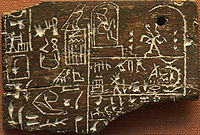- Ebony
-
For other uses, see Ebony (disambiguation).
Ebony is a dense black wood, most commonly yielded by several species in the genus Diospyros, but ebony may also refer to other heavy, black (or dark colored) woods from unrelated species. Ebony is dense enough to sink in water. Its fine texture, and very smooth finish when polished, make it valuable as an ornamental wood. The word "ebony" derives from the Ancient Egyptian hbny, via the Ancient Greek ἔβενος (ébenos), by way of Latin and Middle English.
Contents
Species
Species of ebony include Diospyros ebenum (Ceylon ebony), native to southern India and Sri Lanka; Diospyros crassiflora (Gaboon ebony), native to western Africa; and Diospyros celebica (Macassar ebony), native to Indonesia and prized for its luxuriant, multi-colored wood grain. Mauritius ebony, Diospyros tesselaria, was largely exploited by the Dutch in the 17th century. Some species in the genus Diospyros yield an ebony with similar physical properties, but striped rather than evenly black (Diospyros ebenum).
Uses
Ebony has a long history of use, with carved pieces having been found in Ancient Egyptian tombs. By the end of the 16th century, fine cabinets for the luxury trade were made of ebony in Antwerp. The wood's dense hardness lent itself to refined moldings framing finely detailed pictorial panels with carving in very low relief (bas-relief), usually of allegorical subjects, or with scenes taken from classical or Christian history. Within a short time, such cabinets were also being made in Paris, where their makers became known as ébénistes, which remains the French term for a cabinetmaker.
Modern uses are largely restricted to small items, particularly musical instrument parts, including black piano and harpsichord keys, violin, viola, guitar, double bass, and cello fingerboards, tailpieces, pegs, chinrests, and bow frogs. Many plectrums, or guitar picks, are made from this black wood. Traditionally, the black pieces in chess sets were made from ebony, with rare boxwood or ivory being used for the white pieces. Modern East Midlands-style lace-making bobbins, also being small, are often made of ebony and look particularly decorative when bound with brass or silver wire. Due to its strength, many handgun grips and rifle fore-end tips are made of ebony as well.
As a result of unsustainable harvesting, many species yielding ebony are now considered threatened. Africa in particular has had most of its indigenous ebony cut down illegally, and for this reason it has become common for street traders to blacken lighter woods with shoe polish in an effort to make a sale.
Gallery
-
Ebony & ivory keys on a piano keyboard
-
A sculpture in ebony (African art)
-
Violin fingerboard and tuning pegs
-
Ebony Diospyros ebenum, striped ebony
See also
- African Blackwood
- Calamander wood
- Ebonite
- Ebonol
- Illegal logging in Madagascar
External links
- Red List -- For recommendations found under the IUCN
- Ebony Musical Instrument
Categories: -
Wikimedia Foundation. 2010.









